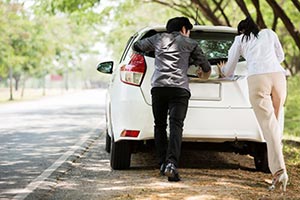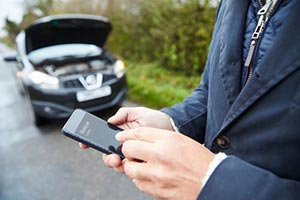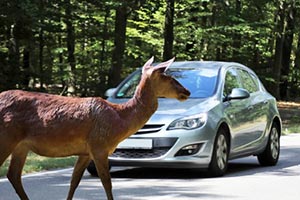Since a deer isn’t another car, how do you approach the situation? Continue reading below to find out what to do after you’ve hit a deer.
Move Your Car Off the Road

The first thing you need to do after you’ve hit a deer is move your car off the road if possible. By moving your car out of the way of traffic, even on an empty road, will help to protect you and your vehicle from further damage. Also, getting your car out of the way will make it safer for you to examine the damage. You don’t want to be walking around your car in the middle of the road.
If you can, make sure to get your car as far away from the deer as possible if it is still on the road.
Depending on the amount and type of damage on your vehicle, you may need to call a local towing company to pull it off the road. If it is unsafe to operate your vehicle, you are better off shutting down the engine. Depending on the surroundings and if the deer is still in the area, it may be safer to stay inside as you wait for assistance to arrive than standing off the road.
Also, make sure to turn on your emergency lights if possible. If the electric components in your car are not functioning, placing cones or flares will also make you more visible to other drivers.
Call the Authorities
A collision with a deer should be treated the same as an accident involving other vehicles. As such, you should call the appropriate authorities after moving your car off the road. This will include the police, or at least 9-1-1.

Although you are not required to call law enforcement to report a deer accident, it will be helpful for local authorities to know about the situation. This way, they can remove the deer from the scene, especially if it is injured and unable to get up.
If the deer is dead, the authorities will also be able to remove it from the road so that it does not cause further accidents.
Check Your Vehicle for Damages
If it is safe to leave your vehicle, it’s time to check for the damage caused to your car. This will help you determine if it’s safe to drive off or if you will need to call for towing. Doing this will also help you decide if you need to get your insurance company involved. There are several important things you’ll want to look for to determine if your car is in driving condition:
-
Loose parts
-
Broken lights
-
Leaking fluids
-
Hood damage
-
Window damage
In some cases, your vehicle might look safe to operate on the outside, but it could have invisible internal damage like a cracked radiator, bent axle, or loose engine valves. Unfortunately, hidden damage is hard to identify unless you’re a skilled mechanic.
Hearing new noises, smelling foul odors, or experiencing new vibrations in your vehicle can be indicative of this kind of damage. In that case, you should not drive your vehicle.
If for any reason you don’t feel safe operating your vehicle, it is best to call a towing company to safely move your car to a mechanic for you. This is especially true if you are in a secluded area and many miles from the nearest town.
Document the Scene (and Stay Away from the Deer)

If you are planning on making a claim with your insurer, you’ll need to document the scene. This can include taking pictures or videos and taking note of the environmental conditions prior to the accident as:
-
Time of day
-
Weather conditions
-
Road conditions
-
The direction the deer came from
-
The address, our nearest address, of the accident
You might also need to know about how fast you were traveling and how you attempted to evade the deer.
Having all this information documented will help you make an accurate claim as your insurance agent will ask many questions.
What Type of Insurance Plans Covers a Deer Crash?
Standard insurance policies do not cover accidents involving deer. You will need comprehensive coverage for such collisions. However, be aware that you will have to pay your deductible before the policy will kick in to pay for the damage costs.
If you were in a deer accident in which you swerved to avoid the deer and wound up hitting another vehicle or someone’s personal property, collision insurance would be required. That’s because hitting another party or their property is not a random occurrence and involves another human being.
How To Sell A Car Damaged By A Deer Accident
There’s an easy way to sell your car if it was damaged in a deer accident (or any other collision): use WeBuyTotaledCars!
If your insurance company has declared your car totaled, we’re happy to make an offer on it for its fair market price, tow it away for free, and pay you on the spot for your car! It takes just 90 seconds to get a quote, and our offers are guaranteed for seven days.
Offers from WeBuyTotaledCars include free towing, title transfer assistance and pickup in 24-48 business hours after you accept our offer. You’ll get paid on the spot for your car — it couldn’t be easier!
Does Liability Insurance Cover Deer Accidents?
Many of us get insurance, in part, because it’s mandatory, but also because we want to be covered for accidents that are not our fault. Liability insurance is the most basic form of insurance that you drivers in most states are required to get. This type of coverage is triggered when you are at fault for damaging another person’s property or causing bodily injury.
By that definition, for accidents involving deer, liability insurance will not cover damages to your vehicle. It can cover damages or injuries sustained by another party, for instance, if you ran through someone’s fence in an attempt to avoid the deer.
Is Hitting A Deer A No-Fault Accident?
If you ever hit a deer, it probably felt like a freak accident. They come out of nowhere and you’re completely caught off guard. You would have to be The Flash to be able to react that quickly. As a result, you’re hoping that this accident doesn’t cause your insurance rates to increase. After all, it wasn’t your fault, right?
Fortunately, in most car accidents involving wild animals, you are legally not considered to be at fault. As a result, you don’t have to worry about your insurance premium rising. However, if you plan on contacting your insurer to cover vehicle repairs, make sure that you have the appropriate coverage. Basic insurance policies do not cover damages caused by deer accidents.
How Does Hitting A Deer Affect Insurance?
In most instances, hitting a deer will not affect your insurance at all. That’s because even if you cause damage to the deer, it is not in the same category as other vehicles, personal property, or drivers. As a result, liability insurance would not be triggered and your rates will not increase.
Even if you have comprehensive insurance, which would cover car damage caused by a deer accident, you can rely on your rates staying the same as this event is random and out of your control.
It’s a Quick and Easy Process
Vehicle Details
Answer a few quick questions and provide a picture if you can.
Offer
In less than two minutes, you’ll have a guaranteed offer.
Accept
Accept the offer if you’re happy with it.
Get Paid
Within 24-48 hours, we will tow your car for FREE and pay you on the spot!

